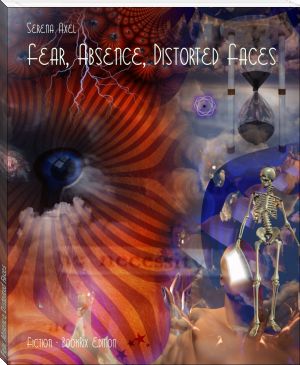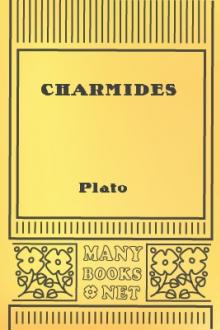The Smoky God - Willis George Emerson (english reading book TXT) 📗

- Author: Willis George Emerson
- Performer: -
Book online «The Smoky God - Willis George Emerson (english reading book TXT) 📗». Author Willis George Emerson
Within a few minutes we were on board the ship, and half an hour later our little fishing-craft had been lifted bodily out of the water by a strange sort of hook and tackle, and set on board as a curiosity.
There were several hundred people on board this, to us, mammoth ship, which we discovered was called “The Naz,” meaning, as we afterward learned, “Pleasure,” or to give a more proper interpretation, “Pleasure Excursion” ship.
If my father and I were curiously observed by the ship’s occupants, this strange race of giants offered us an equal amount of wonderment.
There was not a single man aboard who would not have measured fully twelve feet in height. They all wore full beards, not particularly long, but seemingly short-cropped. They had mild and beautiful faces, exceedingly fair, with ruddy complexions. The hair and beard of some were black, others sandy, and still others yellow. The captain, as we designated the dignitary in command of the great vessel, was fully a head taller than any of his companions. The women averaged from ten to eleven feet in height. Their features were especially regular and refined, while their complexion was of a most delicate tint heightened by a healthful glow.[16]
[16 “According to all procurable data, that spot at the era of man’s appearance upon the stage was in the now lost ‘Miocene continent,’ which then surrounded the Arctic Pole. That in that true, original Eden some of the early generations of men attained to a stature and longevity unequaled in any countries known to postdiluvian history is by no means scientifically incredible.” — Wm. F. Warren, “Paradise Found,” p. 284.]
Both men and women seemed to possess that particular ease of manner which we deem a sign of good breeding, and, notwithstanding their huge statures, there was nothing about them suggesting awkwardness. As I was a lad in only my nineteenth year, I was doubtless looked upon as a true Tom Thumb. My father’s six feet three did not lift the top of his head above the waist line of these people.
Each one seemed to vie with the others in extending courtesies and showing kindness to us, but all laughed heartily, I remember, when they had to improvise chairs for my father and myself to sit at table. They were richly attired in a costume peculiar to themselves, and very attractive. The men were clothed in handsomely embroidered tunics of silk and satin and belted at the waist. They wore knee-breeches and stockings of a fine texture, while their feet were encased in sandals adorned with gold buckles. We early discovered that gold was one of the most common metals known, and that it was used extensively in decoration.
Strange as it may seem, neither my father nor myself felt the least bit of solicitude for our safety. “We have come into our own,” my father said to me. “This is the fulfillment of the tradition told me by my father and my father’s father, and still back for many generations of our race. This is, assuredly, the land beyond the North Wind.”
We seemed to make such an impression on the party that we were given specially into the charge of one of the men, Jules Galdea, and his wife, for the purpose of being educated in their language; and we, on our part, were just as eager to learn as they were to instruct.
At the captain’s command, the vessel was swung cleverly about, and began retracing its course up the river. The machinery, while noiseless, was very powerful.
The banks and trees on either side seemed to rush by. The ship’s speed, at times, surpassed that of any railroad train on which I have ever ridden, even here in America. It was wonderful.
In the meantime we had lost sight of the sun’s rays, but we found a radiance “within” emanating from the dull-red sun which had already attracted our attention, now giving out a white light seemingly from a cloud-bank far away in front of us. It dispensed a greater light, I should say, than two full moons on the clearest night.
In twelve hours this cloud of whiteness would pass out of sight as if eclipsed, and the twelve hours following corresponded with our night. We early learned that these strange people were worshipers of this great cloud of night. It was “The Smoky God” of the “Inner World.”
The ship was equipped with a mode of illumination which I now presume was electricity, but neither my father nor myself were sufficiently skilled in mechanics to understand whence came the power to operate the ship, or to maintain the soft beautiful lights that answered the same purpose of our present methods of lighting the streets of our cities, our houses and places of business.
It must be remembered, the time of which I write was the autumn of 1829, and we of the “outside” surface of the earth knew nothing then, so to speak, of electricity.
The electrically surcharged condition of the air was a constant vitalizer. I never felt better in my life than during the two years my father and I sojourned on the inside of the earth.
To resume my narrative of events; The ship on which we were sailing came to a stop two days after we had been taken on board. My father said as nearly as he could judge, we were directly under Stockholm or London. The city we had reached was called “Jehu,” signifying a seaport town. The houses were large and beautifully constructed, and quite uniform in appearance, yet without sameness. The principal occupation of the people appeared to be agriculture; the hillsides were covered with vineyards, while the valleys were devoted to the growing of grain.
I never saw such a display of gold. It was everywhere. The door-casings were inlaid and the tables were veneered with sheetings of gold. Domes of the public buildings were of gold. It was used most generously in the finishings of the great temples of music.
Vegetation grew in lavish exuberance, and fruit of all kinds possessed the most delicate flavor. Clusters of grapes four and five feet in length, each grape as large as an orange, and apples larger than a man’s head typified the wonderful growth of all things on the “inside” of the earth.
The great redwood trees of California would be considered mere underbrush compared with the giant forest trees extending for miles and miles in all directions. In many directions along the foothills of the mountains vast herds of cattle were seen during the last day of our travel on the river.
“We heard much of a city called “Eden,” but were kept at “Jehu” for an entire year. By the end of that time we had learned to speak fairly well the language of this strange race of people. Our instructors, Jules Galdea and his wife, exhibited a patience that was truly commendable.
One day an envoy from the Ruler at “Eden” came to see us, and for two whole days my father and myself were put through a series of surprising questions. They wished to know from whence we came, what sort of people dwelt “without,” what God we worshiped, our religious beliefs, the mode of living in our strange land, and a thousand other things.
The compass which we had brought with us attracted especial attention. My father and I commented between ourselves on the fact that the compass still pointed north, although we now knew that we had sailed over the curve or edge of the earth’s aperture, and were far along southward on the “inside” surface of the earth’s crust, which, according to my father’s estimate and my own, is about three hundred miles in thickness from the “inside” to the “outside” surface. Relatively speaking, it is no thicker than an egg-shell, so that there is almost as much surface on the “inside” as on the “outside” of the earth.
The great luminous cloud or ball of dull-red fire — fiery-red in the mornings and evenings, and during the day giving off a beautiful white light, “The Smoky God,” — is seemingly suspended in the center of the great vacuum “within” the earth, and held to its place by the immutable law of gravitation, or a repellant atmospheric force, as the case may be. I refer to the known power that draws or repels with equal force in all directions.
The base of this electrical cloud or central luminary, the seat of the gods, is dark and non-transparent, save for innumerable small openings, seemingly in the bottom of the great support or altar of the Deity, upon which “The Smoky God” rests; and, the lights shining through these many openings twinkle at night in all their splendor, and seem to be stars, as natural as the stars we saw shining when in our home at Stockholm, excepting that they appear larger. “The Smoky God,” therefore, with each daily revolution of the earth, appears to come up in the east and go down in the west, the same as does our sun on the external surface. In reality, the people “within” believe that “The Smoky God” is the throne of their Jehovah, and is stationary. The effect of night and day is, therefore, produced by the earth’s daily rotation.
I have since discovered that the language of the people of the Inner World is much like the Sanskrit.
After we had given an account of ourselves to the emissaries from the central seat of government of the inner continent, and my father had, in his crude way, drawn maps, at their request, of the “outside” surface of the earth, showing the divisions of land and water, and giving the name of each of the continents, large islands and the oceans, we were taken overland to the city of “Eden,” in a conveyance different from anything we have in Europe or America. This vehicle was doubtless some electrical contrivance. It was noiseless, and ran on a single iron rail in perfect balance. The trip was made at a very high rate of speed. We were carried up hills and down dales, across valleys and again along the sides of steep mountains, without any apparent attempt having been made to level the earth as we do for railroad tracks. The car seats were huge yet comfortable affairs, and very high above the floor of the car. On the top of each car were high geared fly wheels lying on their sides, which were so automatically adjusted that, as the speed of the car increased, the high speed of these fly wheels geometrically increased. Jules Galdea explained to us that these revolving fan-like wheels on top of the cars destroyed atmospheric pressure, or what is generally understood by the term gravitation, and with this force thus destroyed or rendered nugatory the car is as safe from falling to one side or the other from the single rail track as if it were in a vacuum; the fly wheels in their rapid revolutions destroying effectually the so-called power of gravitation, or the force of atmospheric pressure or whatever potent influence it may be that causes all unsupported things to fall downward to the earth’s surface or to the nearest point of resistance.
The surprise of my father and myself was indescribable when, amid the regal magnificence of a spacious hall, we were finally brought before the Great High Priest, ruler over all the land. He was richly robed, and much taller than those about him, and could not have been less than fourteen or fifteen feet in height. The immense room in which we were received seemed finished in solid slabs of gold thickly studded with jewels, of amazing





Comments (0)